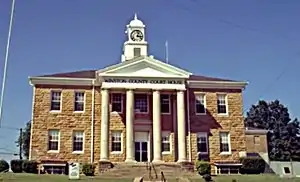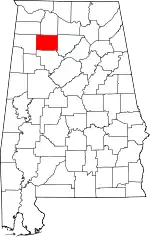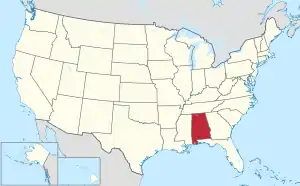Winston County | |
|---|---|
 Winston County courthouse in Double Springs | |
 Location within the U.S. state of Alabama | |
 Alabama's location within the U.S. | |
| Coordinates: 34°08′57″N 87°22′29″W / 34.149166666667°N 87.374722222222°W | |
| Country | |
| State | |
| Founded | February 12, 1850[1] |
| Named for | John A. Winston |
| Seat | Double Springs |
| Largest city | Haleyville |
| Area | |
| • Total | 632 sq mi (1,640 km2) |
| • Land | 613 sq mi (1,590 km2) |
| • Water | 19 sq mi (50 km2) 3.0% |
| Population (2020) | |
| • Total | 23,540 |
| • Estimate (2022) | 23,755 |
| • Density | 37/sq mi (14/km2) |
| Time zone | UTC−6 (Central) |
| • Summer (DST) | UTC−5 (CDT) |
| Congressional district | 4th |
| Website | www |
| |
Winston County is a county of the U.S. state of Alabama. As of the 2020 census, the population was 23,540.[2] Its county seat is Double Springs.[3] Known as Hancock County before 1858,[1] the county is named in honor of John A. Winston, the fifteenth Governor of Alabama.
History
Winston County was established under the name Hancock County on February 12, 1850, from territory that was formerly part of Walker County (a county directly to the south of Winston County).[1] It was originally named for John Hancock, Governor of Massachusetts and famous signer of the American Declaration of Independence, with its county seat at Houston. On January 22, 1858, the county was renamed Winston County to honor Alabama Gov. John A. Winston.
During the American Civil War, Winston County gained attention for its opposition to secession, a sentiment so strong that the county is sometimes referred to as the Free State of Winston.[4] This area had few slaves and saw little benefit to secession.[5] The county today plays on its reputation as the "Free State of Winston" to attract tourists. The county's opposition to the Confederacy is briefly mentioned in the novels To Kill a Mockingbird and Addie Pray.
In 1883, the county seat was moved from Houston to Double Springs to be near the center of the county, since Cullman County was created from the eastern part of Winston County.[6]
The civil-rights judge Frank Minis Johnson of the U.S. Court of Appeals for the Eleventh Circuit was born in Delmar, in Winston County.
National Register of Historic Places
Winston County has four sites listed on the National Register of Historic Places: Archeological Site No. 1WI50, Feldman's Department Store, the Houston Jail, and the Winston County Courthouse.[7]
Geography
According to the United States Census Bureau, the county has a total area of 631 square miles (1,630 km2), of which 613 square miles (1,590 km2) is land and 1.9 square miles (4.9 km2) (3.0%) is water.[8]
Adjacent counties
- Lawrence County (north)
- Cullman County (east)
- Walker County (south)
- Marion County (west)
- Franklin County (northwest)
National protected area
Demographics
| Census | Pop. | Note | %± |
|---|---|---|---|
| 1850 | 1,542 | — | |
| 1860 | 3,576 | 131.9% | |
| 1870 | 4,155 | 16.2% | |
| 1880 | 4,253 | 2.4% | |
| 1890 | 6,552 | 54.1% | |
| 1900 | 9,554 | 45.8% | |
| 1910 | 12,855 | 34.6% | |
| 1920 | 14,378 | 11.8% | |
| 1930 | 15,596 | 8.5% | |
| 1940 | 18,746 | 20.2% | |
| 1950 | 18,250 | −2.6% | |
| 1960 | 14,858 | −18.6% | |
| 1970 | 16,654 | 12.1% | |
| 1980 | 21,953 | 31.8% | |
| 1990 | 22,053 | 0.5% | |
| 2000 | 24,843 | 12.7% | |
| 2010 | 24,484 | −1.4% | |
| 2020 | 23,540 | −3.9% | |
| 2022 (est.) | 23,755 | [9] | 0.9% |
| U.S. Decennial Census[10] 1790–1960[11] 1900–1990[12] 1990–2000[13] 2010–2020[2] | |||
2020 census
| Race / Ethnicity | Pop 2000[14] | Pop 2010[15] | Pop 2020[16] | % 2000 | % 2010 | % 2020 |
|---|---|---|---|---|---|---|
| White alone (NH) | 24,055 | 23,237 | 21,598 | 96.83% | 94.91% | 91.75% |
| Black or African American alone (NH) | 93 | 115 | 131 | 0.37% | 0.47% | 0.56% |
| Native American or Alaska Native alone (NH) | 107 | 139 | 83 | 0.43% | 0.57% | 0.35% |
| Asian alone (NH) | 30 | 59 | 58 | 0.12% | 0.24% | 0.25% |
| Pacific Islander alone (NH) | 2 | 8 | 9 | 0.01% | 0.03% | 0.04% |
| Some Other Race alone (NH) | 8 | 4 | 39 | 0.03% | 0.02% | 0.17% |
| Mixed Race/Multi-Racial (NH) | 176 | 283 | 807 | 0.71% | 1.16% | 3.43% |
| Hispanic or Latino (any race) | 372 | 639 | 815 | 1.50% | 2.61% | 3.46% |
| Total | 24,843 | 24,484 | 23,540 | 100.00% | 100.00% | 100.00% |
As of the 2020 United States census, there were 23,540 people, 9,592 households, and 6,268 families residing in the county.
2010 census
At the 2010 census there were 24,484 people, 10,163 households, and 7,074 families living in the county. The population density was 40 people per square mile (15 people/km2). There were 13,469 housing units at an average density of 22 units per square mile (8.5 units/km2). The racial makeup of the county was 95.6% White, 0.5% Black or African American, 0.7% Native American, 0.2% Asian, 0.1% Pacific Islander, 1.5% from other races, and 1.4% from two or more races. Nearly 2.6% of the population were Hispanic or Latino of any race.[17] There were 10,163 households, 26.2% had children under the age of 18 living with them, 54.2% were married couples living together, 10.9% had a female householder with no husband present, and 30.4% were non-families. Nearly 27.1% of households were made up of individuals, and 12.2% were one person aged 65 or older. The average household size was 2.38, and the average family size was 2.86.
The age distribution was 21.6% under the age of 18, 7.4% from 18 to 24, 23.6% from 25 to 44, 29.6% from 45 to 64, and 17.7% 65 or older. The median age was 43.1 years. For every 100 females, there were 96.5 males. For every 100 females age 18 and over, there were 100.8 males.
The median household income was $33,685 and the median family income was $39,784. Males had a median income of $38,074 versus $23,301 for females. The per capita income for the county was $18,055. 15.4% of the population and 20.6% of families were below the poverty line. 31.4% of those under the age of 18 and 14.4% of those 65 and older were living below the poverty line.
2000 Census
At the 2000 census there were 24,843 people, 10,107 households, and 7,287 families living in the county. The population density was 40 people per square mile (15 people/km2). There were 12,502 housing units at an average density of 20 units per square mile (7.7 units/km2). The racial makeup of the county was 97.32% White, 0.038% Black or African American, 0.46% Native American, 0.13% Asian, 0.01% Pacific Islander, 0.90% from other races, and 0.81% from two or more races. Nearly 1.5% of the population were Hispanic or Latino of any race.[18] There were 10,107 households, 31.80% had children under the age of 18 living with them, 59.6% were married couples living together, 9.10% had a female householder with no husband present, and 27.9% were non-families. Nearly 25.6% of households were made up of individuals, and 11.4% were one person aged 65 or older. The average household size was 2.43, and the average family size was 2.89.
The age distribution was 23.7% under the age of 18, 7.90% from 18 to 24, 28.7% from 25 to 44, 25.5% from 45 to 64, and 14.2% 65 or older. The median age was 38 years. For every 100 females, there were 96 males. For every 100 females age 18 and over, there were 93.5 males.
The median household income was $28,435 and the median family income was $32,628. Males had a median income of $26,206 versus $17,760 for females. The per capita income for the county was $15,738. 17.1% of the population and 12.9% of families were below the poverty line. 21.8% of those under the age of 18 and 23% of those 65 and older were living below the poverty line.
Religion
At the 2010 US Religion Census:[19]
- Southern Baptist Convention (11,113)
- The United Methodist Church (1,117)
- Churches of Christ (978)
- Church of God (Cleveland) (784)
- Assemblies of God (295)
- Catholic Church (223)
Government and politics
Unlike nearly every other county in the Deep South, and in keeping with its history during the American Civil War, Winston County has always been a bastion of support for the Republican Party, even as the Democratic Party utterly dominated Alabama state politics from the end of Reconstruction until the passage of the Civil Rights Act of 1964. For example, in four consecutive presidential elections from 1936 to 1948, Winston County was the only county in the state to vote for the Republican ticket.[20] In 1932, the county backed Democrat Franklin D. Roosevelt by just a single vote, even while Roosevelt carried the state as a whole overwhelmingly. And in 1912, Winston County joined just three other Alabama counties in voting for the Bull Moose Party candidacy of Theodore Roosevelt.[21] The county also voted for Populist candidate James B. Weaver in 1892.[22]
The only Democrat to win the county since 1936 (or to get a majority in it since 1880) has been Jimmy Carter in 1976, and in recent times Winston County has become comparably Republican to the Texas Panhandle.[22] Winston County did vote for George Wallace in 1968, who was the Democratic candidate in the state. Winston was the only county in Alabama to give a majority of its votes to Republican candidate Thomas E. Dewey in 1948 over Dixiecrat Strom Thurmond. In 2020, Republican Donald Trump won just over 90% of the vote in Winston County, the best for any candidate in the county's history.
| Year | Republican | Democratic | Third party | |||
|---|---|---|---|---|---|---|
| No. | % | No. | % | No. | % | |
| 2020 | 10,195 | 90.35% | 974 | 8.63% | 115 | 1.02% |
| 2016 | 9,228 | 89.48% | 872 | 8.46% | 213 | 2.07% |
| 2012 | 8,312 | 85.44% | 1,286 | 13.22% | 130 | 1.34% |
| 2008 | 8,103 | 80.78% | 1,757 | 17.52% | 171 | 1.70% |
| 2004 | 8,130 | 78.00% | 2,236 | 21.45% | 57 | 0.55% |
| 2000 | 6,413 | 68.82% | 2,692 | 28.89% | 213 | 2.29% |
| 1996 | 4,728 | 54.80% | 3,120 | 36.17% | 779 | 9.03% |
| 1992 | 5,550 | 55.01% | 3,415 | 33.85% | 1,124 | 11.14% |
| 1988 | 6,235 | 67.59% | 2,954 | 32.02% | 36 | 0.39% |
| 1984 | 6,845 | 72.22% | 2,624 | 27.69% | 9 | 0.09% |
| 1980 | 4,981 | 59.04% | 3,368 | 39.92% | 87 | 1.03% |
| 1976 | 3,710 | 47.15% | 4,134 | 52.54% | 24 | 0.31% |
| 1972 | 4,971 | 86.14% | 779 | 13.50% | 21 | 0.36% |
| 1968 | 2,174 | 39.33% | 258 | 4.67% | 3,095 | 56.00% |
| 1964 | 3,438 | 71.19% | 0 | 0.00% | 1,391 | 28.81% |
| 1960 | 3,421 | 67.01% | 1,681 | 32.93% | 3 | 0.06% |
| 1956 | 2,998 | 65.60% | 1,570 | 34.35% | 2 | 0.04% |
| 1952 | 2,017 | 59.05% | 1,390 | 40.69% | 9 | 0.26% |
| 1948 | 1,588 | 64.34% | 0 | 0.00% | 880 | 35.66% |
| 1944 | 1,538 | 62.52% | 912 | 37.07% | 10 | 0.41% |
| 1940 | 1,686 | 54.55% | 1,394 | 45.10% | 11 | 0.36% |
| 1936 | 1,428 | 52.77% | 1,270 | 46.93% | 8 | 0.30% |
| 1932 | 1,005 | 49.78% | 1,006 | 49.83% | 8 | 0.40% |
| 1928 | 2,085 | 75.96% | 659 | 24.01% | 1 | 0.04% |
| 1924 | 1,096 | 61.02% | 650 | 36.19% | 50 | 2.78% |
| 1920 | 2,307 | 68.99% | 1,037 | 31.01% | 0 | 0.00% |
| 1916 | 1,107 | 59.94% | 727 | 39.36% | 13 | 0.70% |
| 1912 | 292 | 17.18% | 508 | 29.88% | 900 | 52.94% |
| 1908 | 949 | 67.59% | 443 | 31.55% | 12 | 0.85% |
| 1904 | 789 | 55.21% | 602 | 42.13% | 38 | 2.66% |
| 1900 | 519 | 47.75% | 539 | 49.59% | 29 | 2.67% |
| 1896 | 589 | 62.07% | 349 | 36.78% | 11 | 1.16% |
| 1892 | 2 | 0.18% | 526 | 47.99% | 568 | 51.82% |
| 1888 | 323 | 59.48% | 220 | 40.52% | 0 | 0.00% |
| 1884 | 184 | 58.41% | 131 | 41.59% | 0 | 0.00% |
| 1880 | 126 | 45.82% | 149 | 54.18% | 0 | 0.00% |
Transportation
Major highways
Rail
Communities
City
- Haleyville (partly in Marion County)
Towns
- Addison
- Arley
- Double Springs (county seat)
- Lynn
- Natural Bridge
- Nauvoo (partly in Walker County)
Unincorporated communities
Ghost towns
See also
References
- 1 2 3 "ACES Winston County Office" (links/history), Alabama Cooperative Extension System (ACES), 2007, webpage: ACES-Winston.
- 1 2 "State & County QuickFacts". United States Census Bureau. Retrieved September 10, 2023.
- ↑ "Find a County". National Association of Counties. Retrieved June 7, 2011.
- ↑ Andrews, Evan; ‘6 Unionist Strongholds in the South during the Civil War’
- ↑ Coates, Ta-Nehisi (December 23, 2010). "The Republic of Winston". The Atlantic. Retrieved February 17, 2022.
- ↑ Owen, Thomas McAdory. History of Alabama and Dictionary of Alabama Biography. Chicago: S. J. Clarke Publishing Co., 1921
- ↑ "National Register Information System". National Register of Historic Places. National Park Service. July 9, 2010.
- ↑ "2010 Census Gazetteer Files". United States Census Bureau. August 22, 2012. Retrieved August 22, 2015.
- ↑ "Annual Estimates of the Resident Population for Counties: April 1, 2020 to July 1, 2022". Retrieved September 10, 2023.
- ↑ "U.S. Decennial Census". United States Census Bureau. Retrieved August 22, 2015.
- ↑ "Historical Census Browser". University of Virginia Library. Retrieved August 22, 2015.
- ↑ Forstall, Richard L., ed. (March 24, 1995). "Population of Counties by Decennial Census: 1900 to 1990". United States Census Bureau. Retrieved August 22, 2015.
- ↑ "Census 2000 PHC-T-4. Ranking Tables for Counties: 1990 and 2000" (PDF). United States Census Bureau. April 2, 2001. Retrieved August 22, 2015.
- ↑ "P004 HISPANIC OR LATINO, AND NOT HISPANIC OR LATINO BY RACE – 2000: DEC Summary File 1 – Winston County, Alabama". United States Census Bureau.
- ↑ "P2 HISPANIC OR LATINO, AND NOT HISPANIC OR LATINO BY RACE – 2010: DEC Redistricting Data (PL 94-171) – Winston County, Alabama". United States Census Bureau.
- ↑ "P2 HISPANIC OR LATINO, AND NOT HISPANIC OR LATINO BY RACE - 2020: DEC Redistricting Data (PL 94-171) – Winston County, Alabama". United States Census Bureau.
- ↑ "U.S. Census website". United States Census Bureau. Retrieved August 19, 2015.
- ↑ "U.S. Census website". United States Census Bureau. Retrieved May 14, 2011.
- ↑ "Winston County, Alabama". The Association of Religion. Retrieved March 22, 2015.
- ↑ See 1936 election map by county.
- ↑ 1912 election map by county.
- 1 2 The Political Graveyard; Winston County, Alabama
- ↑ "Dave Leip's Atlas of U.S. Presidential Elections". Retrieved November 21, 2016.
External links
- Winston County is covered by the Northwest Alabamian Newspaper.
- Winston County map of roads/towns (map © 2007 Univ. of Alabama).
- Winston County, Alabama: The Free State of Winston
- Winston County article in the Encyclopedia of Alabama